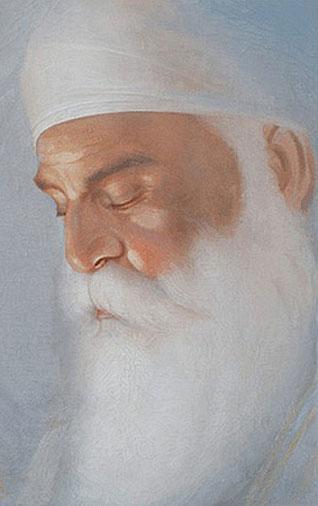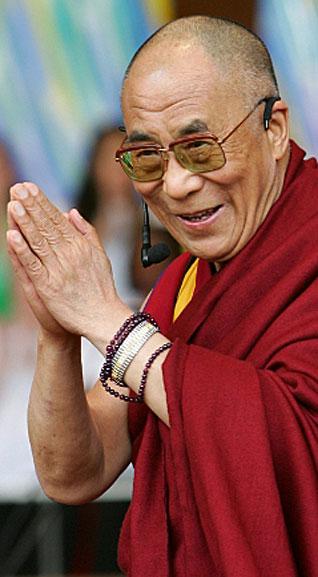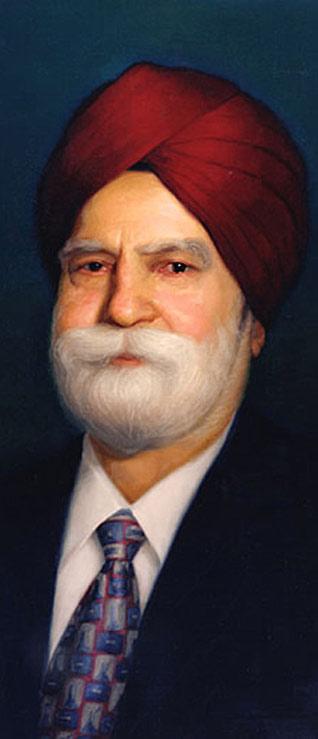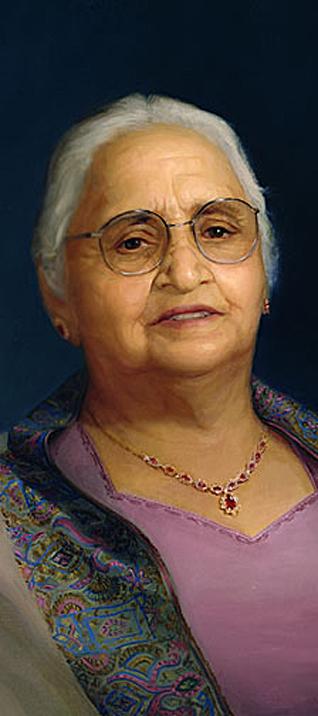
Below - The first and second images from the bottom are from portraits in oil by New York artist Manu Kaur Saluja.

Dalai
Lama

Sardar
Ishar
Singh

Sardarni
Kuljit
Kaur
People
Dalai Lama Recipient of Inaugural Guru Nanak Interfaith Prize
His Holiness the 14th Dalai Lama, Tenzin Gyatso, has been selected as the first recipient of Hofstra University's international Guru Nanak Interfaith Prize, Hofstra President Stuart Rabinowitz announced today.
The $50,000 prize, which recognizes extraordinary service in the field of interfaith dialogue, will be presented to His Holiness on November 18, 2008 in India by a delegation including Hofstra officials, the family of Sardar Ishar Singh Bindra, which established the prize at Hofstra, and former Indian Prime Minister I.K. Gujral, a member of the Guru Nanak Interfaith Prize Honorary Committee.
"There are few missions as important for a university as the advancement of understanding among all peoples", said Hofstra University President Stuart Rabinowitz. "Awarding this prize allows us to recognize those who bring together people of all faiths, which now, more than ever, is important for the peace and prosperity of our world. We are pleased to bestow Hofstra's inaugural Guru Nanak Interfaith Prize on a person as worthy and renowned as His Holiness the Dalai Lama".
Tashi Wangdi, the Dalai Lama's U.S. representative, accepted the prize today via telephone on behalf of His Holiness during a news conference at Hofstra, located in Hempstead, Long Island, New York. "We are very happy that this award has been given to His Holiness in recognition of his many years of promoting interfaith dialogue and understanding", he said.
Sardar Tejinder Singh Bindra, son of Sardar Ishar Singh, said: "We are immensely pleased with the selection. There could be no more deserving candidate than His Holiness, and, to me, what stands out most is that Guru Nanak stood for brotherhood, peace and wonderful relations between communities, and I think His Holiness personifies that the best".
The prize, to be awarded every other year, was established in 2006 through an endowment from the family of Ishar Singh Bindra to be given by Hofstra University to individuals or organizations that have worked to facilitate the religious dialogue that is indispensable to reducing religious conflict.
The prize was named for the founder of the Sikh religion and was meant to encourage understanding of various religions and to build bridges between faith communities. Guru Nanak believed that all humans were born equal regardless of skin color, ethnicity, nationality and gender.
There were 75 individuals and groups nominated for the first prize, representing interfaith efforts in Africa, Asia, Europe and the Middle East, as well as throughout the United States and Canada.
The establishment of the prize by Mr. Bindra's family followed the creation of Hofstra's Department of Religion in 2005 and the endowment of chairs in Sikh, Catholic and Jewish studies.
The Sikh Chair - the Sardarni Kuljit Kaur Bindra Chair in Sikh Studies, named for the family matriarch - was also established through an endowment from Mr. Bindra's family. Both gifts are intended to increase understanding of different religions, including Sikhism, a world religion with more than 25 million adherents.
March 25, 2008
Conversation about this article
1: Kiren K. Singh (New York, U.S.A.), March 26, 2008, 10:10 AM.
I sincerely applaud the Bindras (who are family friends) for their commitment to peace and unity of all people crossing the divide of religious differences. Our duty to do seva as sikhs doesn't translate only to work for our community but rather is more pronounced when done on a global level. Today, we do not merely live in a town or city, we do not live in a country ... we are citizens of the world!
2: Harmeet Singh (Chicago, IL, U.S.A.), March 27, 2008, 1:28 PM.
Although the intentions seem quite benevolent, I disagree with the concept of naming prizes after the names of Sikh Gurus. An Interfaith prize given to honour achievements for interfaith dialogue could be named "Gosht Maan" (Honor for Dialogue), for example; it should be after the message of Gurbani itself, that is, "Gosht" or dialogue as practiced by Guru Nanak himself. Guru Nanak probably won't be happy to see attaching ourselves with him by naming universities and prizes after Guru Nanak, rather he would want us to attach ourselves with the message. [Editor: Conjectures over whether Guru Nanak would be unhappy about this, and happy about that, etc., etc., is purely a projection of our own opinions, and not a productive exercise.]
3: Sandeep Bali (Mumbai, India), April 01, 2008, 11:15 PM.
It's just my opinion, but I think it would be better if the prize was given to someone from the general public instead of someone like the Dalai Lama. He is already so well recognized that he doesn't need any award to recognize his contributions. However, if it was given to someone from the general public, it would boost their spirits. Just because you can doesn't mean you should, as the Hofstra University did. Awarding Dalai Lama will surely thrust the university into the news, but it will hardly support the values of the award.
4: Gurteg Singh (NY), April 05, 2008, 7:58 PM.
"His Holiness" the Dalai Lama NEVER ONCE protested the brutal attack on Harmandair Sahib (only a few hundred miles from Dharamsala) in 1984 or the genocide of tens of thousands of innocent Sikhs by his hosts - the New Delhi rulers. It is a grave mistake for any Sikh associated organization to give an award in the name of Guru Nanak to an individual who for his personal political interests ignored his moral responsibility. [Editor: I suggest we need to be pragmatic, gracious, generous and compassionate in such matters. It is not difficult to imagine the difficulties the Dalai Lama would have faced from an unscrupulous regime in Delhi if he, who was himself a refugee and in India at the pleasure of the local powers to be, had raised his voice in an "internal" matter. We should think this one out and, if posssible, give him the benefit of the doubt. It is time we refrained from knee-jerk reactions to complicated situations.]


